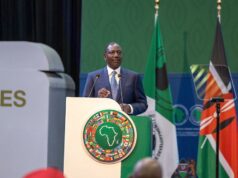The substantial depreciation of the Kenyan shilling against the US dollar has inflicted substantial exchange losses on foreign-owned enterprises and investors, jeopardizing Kenya’s status as a preferred investment haven.
An examination of dividend repatriation across thirteen listed corporations reveals that foreign investors have incurred a staggering Sh13 billion loss due to currency depreciation alone.
Investors have suffered these losses by purchasing foreign currency from the local market to transfer funds overseas, effectively nullifying much of the year-on-year gains they may have experienced in terms of the Kenyan shilling.
A challenging economic environment has compelled prominent firms on the Nairobi Securities Exchange (NSE), such as Safaricom and East African Breweries (EABL), to reduce dividend payouts this year compared to 2022, further exacerbating the year-on-year impact on repatriated payments.
Since last August, the Kenyan shilling has devalued against the US dollar by 20 percent, averaging 143.27 units according to the official exchange rate provided by the Central Bank of Kenya (CBK).
However, retail buyers at major commercial banks are currently paying between Sh148 and Sh149 per unit, as observed through a recent check at city center branches this week. These significant banks supply the majority of foreign exchange to institutional investors.
Companies with substantial foreign ownership represent some of the largest purchasers of dollars during dividend seasons, facilitating payments to their overseas shareholders.
Prof. XN Iraki, an economist at the University of Nairobi, remarked, “Investors will face losses when repatriating their profits. Moreover, exchange rate unpredictability heightens investment risk, and investors favor stability.”
For instance, due to exchange losses, Vodacom Group and Vodafone, holding a combined 40 percent stake in Safaricom, have forgone tens of millions of dollars in dividends.
In 2022, these entities received a total of Sh22.2 billion in dividends (Sh1.39 per share) from their stake, which, at the exchange rate of 119.10 units a year ago, equated to $186.7 million.
However, their 2023 dividend of Sh19.2 billion (Sh1.20 per share), while being Sh3 billion lower in shilling terms, amounts to $134 million at the current dollar rate – a decline of $52.7 million (Sh7.6 billion).
Standard Chartered Plc, holding a 73.9 percent stake in its Kenyan subsidiary, experienced a Sh1.1 billion reduction in dividends after the local unit decreased its payout from Sh20 in 2022 to Sh16 last year.
Taking into account exchange rate fluctuations, the parent company’s dollar-denominated dividend shrank by $15.7 million (equivalent to Sh2.2 billion at the present rate).
The weaker shilling has also impacted parent firms that had enjoyed increased dividend earnings from Kenya.
Standard Bank of South Africa, the majority owner of Stanbic Kenya, witnessed its earnings rise from Sh2.66 billion last year to Sh3.73 billion this year, as the unit increased its payout to Sh12.6 per share from Sh9.
However, in dollar terms, the change amounted to $3.7 million (Sh530 million) when accounting for the rate variation between the two periods.
A primary concern revolves around the potential of these exchange losses to discourage investment inflows into the country and hinder reinvestment of earnings into the local economy, given the diminishing real returns in the future.
Wesley Manambo, an analyst at Genghis Capital, explained, “This could lead to investor apathy, particularly among those who can secure a similar rate of return in their home markets. It also dampens reinvestment, and if repatriation is not balanced by inflows, it exerts more pressure on the local currency, perpetuating a prolonged weakening cycle.”
Multinational companies that report earnings in dollars for their local units have also borne the brunt of exchange losses.
Vivo Energy Group Plc, the parent firm of Vivo Energy Kenya, disclosed that its local operations experienced a 15 percent decline in revenue to $785 million for the first half of the year ending in June, compared to $924 million in the same period last year.
In terms of Kenyan shillings, using the exchange rate from June of the previous year, the revenue for the first half of 2022 amounted to Sh108.9 billion, while that of June 2023 at the prevailing rate equated to Sh110.3 billion.
The multinational attributed lower sales across its markets partly to the adverse impact of depreciating currencies on profit margins.
Airtel Africa, in its financial report for the first quarter of 2024 covering the three months ending in June, indicated that revenue from its East Africa region totaled $519 million, reflecting a year-on-year growth of 14.2 percent. This growth would have been 22.8 percent higher without the depreciation of local currencies.










